Meeting Global Standards Makes Stand Tools a Major Player
2010/12/03 | By Steve Chuang | STAND TOOLS ENTERPRISE CO., LTD.Maker’s digital wrenches are calibrated and tested in TAF lab
Stand Tools Enterprise Co., Ltd. has been focused on pursuing absolute accuracy and impeccable product quality in building digital torque wrenches over the past few years, efforts that have helped the maker to be Taiwan’s only hand tool maker with a world-caliber inspection lab accredited by TAF (Taiwan Accreditation Foundation) and ILAC-MRA, hence differentiating itself from its peers.
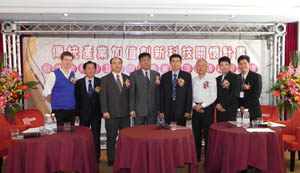
To present insiders’ views and promote information sharing, the Metal Industries Research & Development Centre (MIRDC) held the “Hand Tool Industry’s Clustering and Innovation Forum” in Taichung, central Taiwan on October 29, 2010, in cooperation with the Department of Industrial Technology under Ministry of Economic Affairs and Taiwan Hand Tool Manufacturers’ Association.
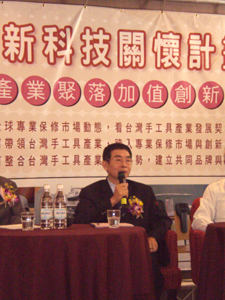
Among other heavyweights, H.S. Hsiao, chairman of Stand Tools, was one of the seven invited panelists at the forum, whose achievement in developing MEMS (micro-electro mechanical systems) chip-integrated digital wrenches likely has built profile for his firm and earned him a place as speaker at the event. The forum organizer, knowing that Taiwanese hand tool makers have stepped up development of auto repair and maintenance tools in recent years and savvy branding strategies to sustain business growth, invited several other big hitters, including Mark Wu, CEO of King Tony (Taiwan’s No. 1 hand tool producer and vendor with over 70 overseas footholds); M.H. Lin, director of manufacturing at Central Motor (Toyota Motor’s acquired Taiwanese automaker of Lexus sedans; James Soames and owner of Subcarma International Associates Co., Ltd. (a well-known marketing consultant from the U.K. and now operating in central Taiwan), as panelists to share viewpoints on the future of the industry. The forum drew nearly one hundred industry professionals.
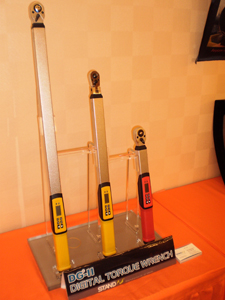
Taiwan’s First MEMS Digital Wrench
Stand Tools began as an OEM (original equipment manufacturer) of ratchet screwdrivers in 1988, and later diversified into producing magnetic tools. However, keen awareness and increasing competition globally motivated the company to venture into research and development of MEMS sensor, which the company managers Alston, Calvin and Brand Hsiao believe are the key to enhancing precision of torque wrenches.
MEMS is the integration, via micro-fabrication technology, of mechanical elements, sensors, actuators, and electronics on a single chip, which can collect ambient information through measuring mechanical, thermal, biological, chemical, optical and magnetic phenomena more precisely.
But, Brand Hsiao admitted that development of an MEMS-integrated digital torque wrench was a tough, costly and time-consuming project, because it called for knowledge in electronics, microelectronics, material mechanics, physics and chemistry. “Not only did we have to brainstorm to apply different theories and know-how related to the newest micro-fabrication technologies to produce traditional hand tools, but also navigate strange waters. We had to make do with existing, limited resources and team up with other industries.”
Besides, building an MEMS sensor into a torque wrench was also a challenge. Brand explained that manufacturing methods from heat treatment and drilling to milling must had to be changed, mainly because MEMS sensors are precise and sophisticated microelectronic components, which can malfunction easily due to even the smallest deviations in either size or finishing.
Where there is a will, there is a way sums up Stand Tools’ achievement in the gargantuan project, for the team ultimately developed Taiwan’s first “marketable” MEMS-integrated digital wrench in 2008.
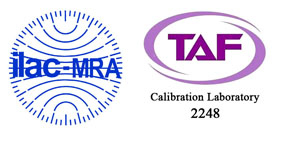
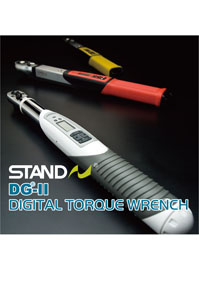
Building Credibility
Promoting a new technology calls for building credibility. So right after debuting its MEMS digital wrench in Europe, the maker immediately began to set up a calibration lab in its factory that can be globally accredited.
So far so good. After working with the Industrial Technology Research Institute (ITRI) for two years, the maker was certified by the TAF for its Stand Tools Calibration Laboratory this July, as well as being approved to use the ILAC-MRA mark some time later.
The single-most remarkable achievement by Stand Tools is independently developing a TAF-approved torque rheometer, or a calibration beam, in its testing and calibrating lab according to the concept of “measurement accountability.” Only two other in-house calibration beams recognized by international authorities exist in Taiwan, according to the company.
A torque rheometer is a beam with weights hanging on both ends, and a hole at the fulcrum to allow a digital torque wrench to rest. When weights are hung on the beam to pull by gravity a torque a wrench, engineers can easily and precisely read with total accuracy the torque to calibrate the wrench.
Measurement Accountability
To assure “measurement accountability,” Stand Tools commissioned a staff from the National Measurement Laboratory (NML) to ascertain data as the gravitational acceleration, longitude and latitude of the point where the calibration beam is located. With advanced instruments and help from the TAF staff, the company measured 978821.964 (mGal) in gravitational acceleration at the point, as well as certifying the mass and length of the calibration beam.
Confirmation of gravitational acceleration is critical for such force varies with longitude and latitude to affect a calibration beam minutely. Therefore, the calibration beam in Stand Tools Calibration Laboratory is unlike conventional testing instruments with electronic transducers that calculate torque through a linear function.
In other words, the company can assure users with test reports from the lab that its torque wrenches are reliable, accurate according to global standards. Being able to offer world-class testing undoubtedly enhances Stand Tools’s competitiveness in the segment for digital torque wrenches, enabling the maker to garner customer trust to help build sustainable business, as well as become a reputable global supplier of professional tools.
Be Market Savvy
Chairman H.S. Hsiao observed that economic fluctuations in advanced countries and the rise of emerging economies have actually fueled expansion of the global market for vehicle repair tools and maintenance equipment in recent years, and that venturing into the segment is among the strategies to boost Taiwan’s presence in the global supply chain.
However, Hsiao stressed that manufacturers aiming to tap such business opportunities must fully understand the competitive landscape and enrich themselves with market knowledge before switching production to such kinds of tools. For example, he works with Central Motor and personally visited the automaker’s factories to see real-world end-user demand to better understand the market.
Besides, Hsiao also stressed the importance of enhancing technologies and know-how to exceed competitors.
“From the viewpoint of an ODM (original design manufacturer), a supplier should build marketable products and hence has to study markets from the ground up,” Hsiao said. “Simply, we must provide a truly functional and practical auto repair tool to end users. This is the only way to stay ahead of competitors.”
Already trying to break new ground again, Hsiao revealed that his company has been developing 5.5mm Borescope, a future auto diagnostic tool to be used in telescopic cameras.

